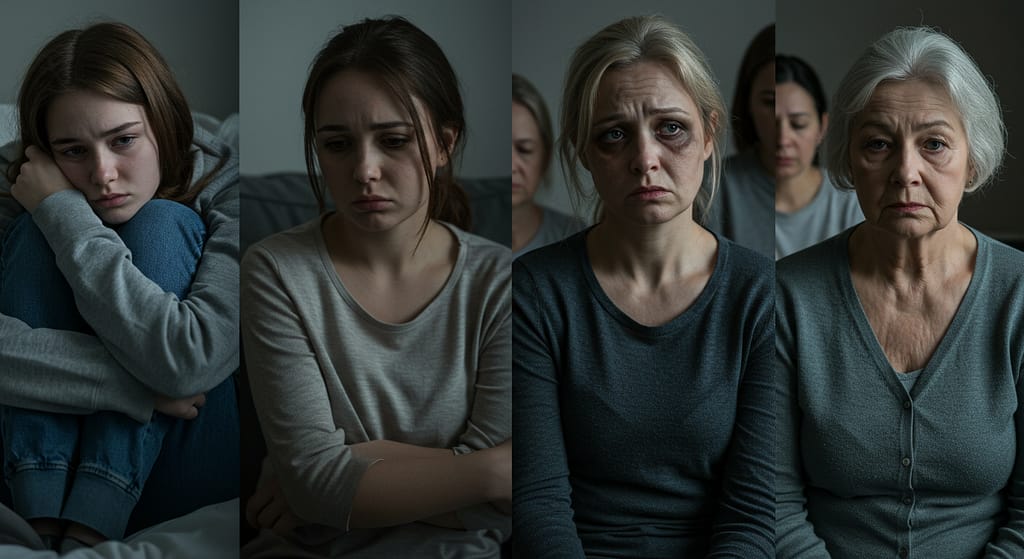Table of Contents
- Introduction
- Hormonal Variation and Its Impact on Women’s Mental Health
- Puberty and Early Onset Depression
- Reproductive Age and Risk of Depression
- Depression Around Menopause
- Postmenopause and Emotional Recovery
- Hidden Struggles of Caregiving Women
- Tailored Depression Treatments
- Final Thoughts and Encouragement
Introduction
Depression treatments for women require a unique approach because women experience mental health challenges differently than men. Globally, women are more likely to be diagnosed with depression, with rates influenced by hormones, societal pressures, and life events. Understanding these patterns is vital for early intervention and effective care.

For more information on depression treatments, see Mayo Clinic – Depression in Women (DoFollow).
Hormonal Variation and Its Impact on Women’s Mental Health
Women’s hormone levels fluctuate throughout life, directly impacting mood and susceptibility to depression. Conditions such as:
- Premenstrual Dysphoric Disorder (PMDD)
- Postpartum Depression
- Seasonal Affective Disorder (SAD)
highlight the interplay between hormones and emotional health. Hormonal variations can lead to mood swings, irritability, fatigue, and anxiety. While some symptoms ease after menopause, depression can still emerge, necessitating ongoing awareness and personalized depression treatments.
Puberty and Early Onset Depression
Early puberty (before age 11) is a known risk factor for depression in adolescent girls. Early exposure to estrogen and other hormones, combined with social pressures and body image concerns, can trigger emotional vulnerability. Symptoms to watch for include:
- Persistent sadness or irritability
- Withdrawal from peers or hobbies
- Declining academic performance
Parents and caregivers should be proactive in recognizing early signs and seeking therapy or counseling if needed.
Reproductive Age and Risk of Depression
Women aged 20–45 face the highest risk of depression due to multiple life pressures, including:
- Career challenges and work-related stress
- Relationship and family responsibilities
- Motherhood and childcare demands
- Societal expectations and body image pressures
Research shows that around 34% of women in this age group report symptoms of major depression. Early recognition and interventions, such as therapy, support groups, or medication, are essential for maintaining mental health.
Depression Around Menopause
Menopause brings hormonal shifts that may exacerbate depressive symptoms. Common challenges include:
- Mood swings and irritability
- Sleep disturbances and insomnia
- Appetite changes
- Increased anxiety or low energy
Distinguishing between normal menopausal changes and clinical depression is critical for recommending effective depression treatments. Healthcare providers may suggest hormone therapy, antidepressants, or cognitive behavioral therapy (CBT) tailored to menopausal women.
For guidance, see National Institute on Aging – Menopause and Mental Health (DoFollow).
Postmenopause and Emotional Recovery
After menopause, some women experience reduced depressive symptoms as hormone levels stabilize. However, depression can still occur due to:
- Seasonal affective changes
- Loneliness or social isolation
- Unresolved life stressors or trauma
Ongoing mental health support and regular check-ins with healthcare providers remain important. Lifestyle adjustments—exercise, nutrition, mindfulness, and social engagement—can complement formal depression treatments.
Hidden Struggles of Caregiving Women
Women who are caregivers, including grandmothers, homemakers, or working professionals, often carry invisible emotional burdens. Risks for depression in this group include:
- Social isolation
- Lack of sleep and personal time
- Feeling undervalued or unappreciated
- Chronic stress from balancing family and personal responsibilities
Caregiving women should be encouraged to seek counseling, join support groups, and explore stress management techniques to protect mental health.
Tailored Depression Treatments
Effective depression treatments for women must consider both biological and emotional factors. Common approaches include:
- Therapy
- Cognitive Behavioral Therapy (CBT)
- Interpersonal Therapy (IPT)
- Group or family therapy
- Medication
- SSRIs, SNRIs, or hormone-based therapies
- Personalized dosing based on hormonal and metabolic factors
- Lifestyle Interventions
- Regular exercise to boost mood and reduce stress
- Balanced diet rich in omega-3s, vitamins, and minerals
- Mindfulness practices, yoga, or meditation
- Alternative and Complementary Approaches
- Music therapy, journaling, and creative expression
- Social engagement and peer support networks
Combining these approaches increases efficacy and addresses unique challenges women face at different life stages.
Final Thoughts and Encouragement
Depression in women is influenced by a combination of hormones, life stressors, and social pressures. Awareness of these factors and proactive, tailored interventions are critical for improving mental health.
Key takeaways:
- Recognize risk windows: puberty, reproductive years, menopause, and caregiving phases
- Seek professional guidance early to maximize treatment outcomes
- Adopt holistic approaches that integrate therapy, lifestyle changes, and medication if needed
With early intervention, support, and awareness, women can regain emotional balance and lead fulfilling lives.
